Colloquium Lecturers and Advisers
Tuesday, September 3
First Day of Class – EPIIC Orientation
Thursday, September 5
Genocide and Mass Atrocities – Conceptual and Definitional Debates
Lecturer: Professor Williams
Tuesday, September 10
Genocide and the Human Condition: DNA and Faith
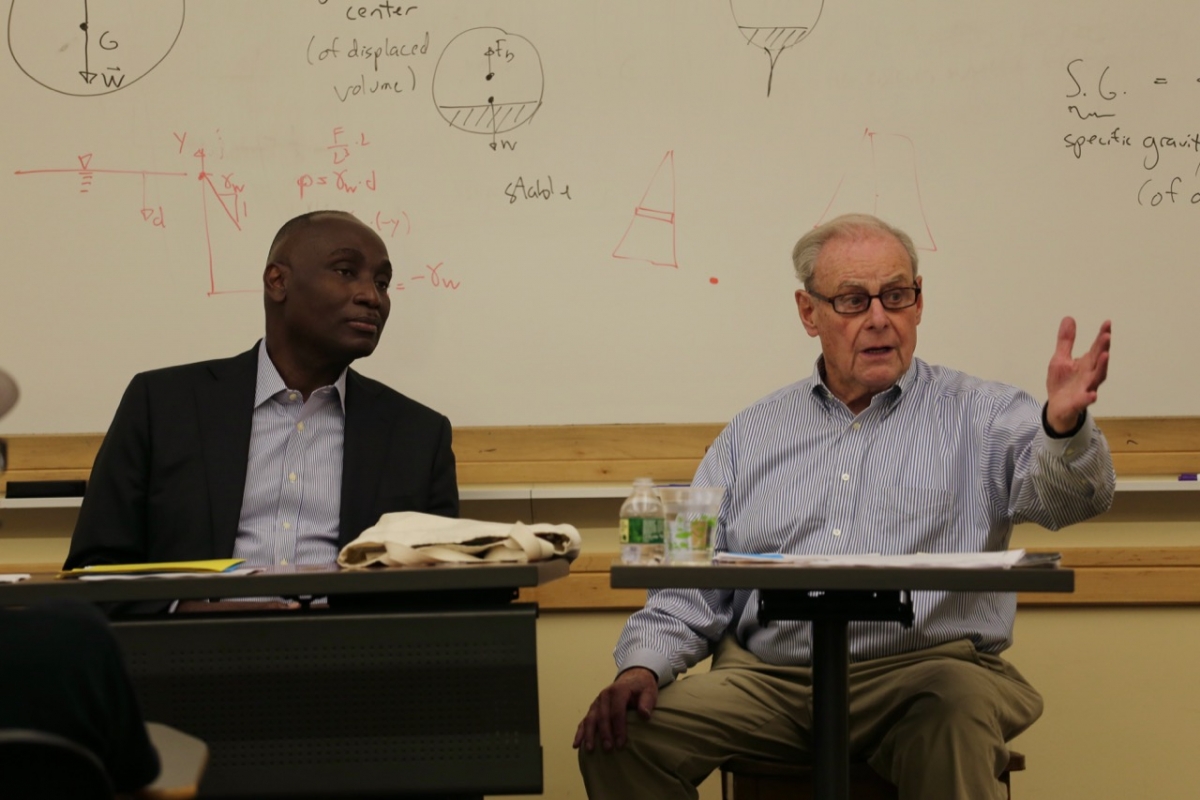 Guest Lecturer: Professor Sol Gittleman, Tufts University
Guest Lecturer: Professor Sol Gittleman, Tufts University
Sol Gittleman retired in 2016 after fifty-two years on the Tufts faculty. He was Professor of German, and also taught in the departments of English, History, Drama, and Comparative Religion. From 1981-2002, he served as University Provost. He has written books on German literature, Yiddish literature, American-Jewish literature, American higher education, and American baseball history. He is now the Alice and Nathan Gantcher University Professor, Emeritus.
Thursday, September 12
Genocide and Indigenous Peoples in North America
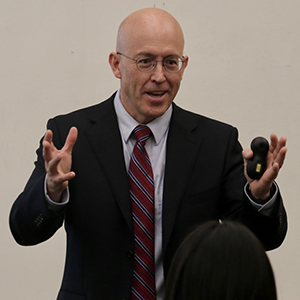 Guest Lecturer: Professor Alex Alvarez, Northern Arizona University
Guest Lecturer: Professor Alex Alvarez, Northern Arizona University
Alex Alvarez is Professor in the Department of Criminology and Criminal Justice at Northern Arizona University. From 2001 until 2003 he was the founding Director of the Martin-Springer Institute for Teaching the Holocaust, Tolerance, and Humanitarian Values. In 2017-2018, he served as the Ida E. King Distinguished Visiting Scholar in Holocaust and Genocide Studies at Stockton University. His main areas of study are in the areas of collective and interpersonal violence, including homicide and genocide. His first book, Governments, Citizens, and Genocide, was published by Indiana University Press in 2001. His other books include Murder American Style (2002), Violence: The Enduring Problem (2007, 2013 2nd ed., 2017 3rd ed.), Genocidal Crimes (2009), and Native America and the Question of Genocide (2014). His latest book, Unsteady Ground: Climate Change, Conflict, and Genocide was published in July 2017 with Rowman & Littlefield. He has also served as an editor for the journal Violence and Victims and was a founding co-editor of the journal Genocide Studies and Prevention.
Tuesday, September 17
Forecasting and Early Warning of Genocide
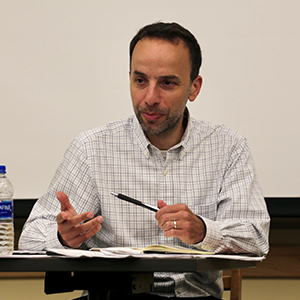 Guest Lecturer: Lawrence Woocher, Research Director for the Simon-Skjodt Center for the Prevention of Genocide, U.S. Holocaust Memorial Museum
Guest Lecturer: Lawrence Woocher, Research Director for the Simon-Skjodt Center for the Prevention of Genocide, U.S. Holocaust Memorial Museum
Lawrence Woocher is Research Director for the Simon-Skjodt Center for the Prevention of Genocide at the U.S. Holocaust Museum and research director of the Political Instability Task Force at Science Applications International Corporation (SAIC). Prior to assuming this role in September 2011, he was a senior program officer at the United States Institute of Peace, where he focused on early warning, conflict prevention, and the prevention of genocide and mass atrocities. He was a member of the executive committee and lead expert on early warning for the Genocide Prevention Task Force, co-chaired by former Secretary of State Madeleine Albright and former Secretary of Defense William Cohen. He is also a lecturer at the Elliott School of International Affairs at George Washington University. Before joining USIP in late 2006, Woocher was a research fellow at Columbia University’s Center for International Conflict Resolution and, concurrently, a consultant on early warning to the Office of the Special Adviser to the UN Secretary-General on the Prevention of Genocide.
Thursday, September 19
The Armenian Genocide
Guest Lecturers: Dr. Joyce Barsam, Vice President, Tavitian Foundation, and Ambassador Rouben Shougarian, The Fletcher School of Law and Diplomacy
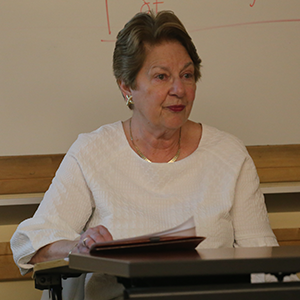 Joyce Barsam began her career in higher education teaching French language and literature at Cardinal Cushing College in Brookline, MA, where she chaired the Department of Modern Languages, and subsequently taught at Northeastern University in Boston, MA. Dr. Barsam earned her BA and PhD from Tufts and an MA from Stanford University. She was elected Tufts Alumni Trustee in 1994 and chaired the Academic Affairs Committee as well as served on the Executive Committee and the Board of Overseers for Arts and Sciences. She currently serves as Trustee Emerita of Tufts University. The collapse of the former Soviet Union and the emergence of an independent Republic of Armenia changed the professional trajectory of this daughter of Armenian Genocide survivors from teaching French to focusing on educational opportunities in the US for students from Armenia. Dr. Barsam currently serves on the Board of Advisors of the Fletcher School and is also Vice President and Trustee of the Tavitian Foundation, Inc., which sponsors scholarships in higher education for students of Armenian descent. The Foundation's main focus now is the Tavitian Scholars Program at the Fletcher School of Law and Diplomacy. It has provided all the funding for advanced training in international affairs to over 300 young government mid-career professionals from Armenia to study at the Fletcher School since 1999. This collaboration has strengthened governance in Public Policy and Public Administration in all ministries and agencies in the newly independent Armenia, from the Ministries of Foreign Affairs, Justice, Finance, Education, Health, President’s Office, Parliament, etc., to the Central Bank.
Joyce Barsam began her career in higher education teaching French language and literature at Cardinal Cushing College in Brookline, MA, where she chaired the Department of Modern Languages, and subsequently taught at Northeastern University in Boston, MA. Dr. Barsam earned her BA and PhD from Tufts and an MA from Stanford University. She was elected Tufts Alumni Trustee in 1994 and chaired the Academic Affairs Committee as well as served on the Executive Committee and the Board of Overseers for Arts and Sciences. She currently serves as Trustee Emerita of Tufts University. The collapse of the former Soviet Union and the emergence of an independent Republic of Armenia changed the professional trajectory of this daughter of Armenian Genocide survivors from teaching French to focusing on educational opportunities in the US for students from Armenia. Dr. Barsam currently serves on the Board of Advisors of the Fletcher School and is also Vice President and Trustee of the Tavitian Foundation, Inc., which sponsors scholarships in higher education for students of Armenian descent. The Foundation's main focus now is the Tavitian Scholars Program at the Fletcher School of Law and Diplomacy. It has provided all the funding for advanced training in international affairs to over 300 young government mid-career professionals from Armenia to study at the Fletcher School since 1999. This collaboration has strengthened governance in Public Policy and Public Administration in all ministries and agencies in the newly independent Armenia, from the Ministries of Foreign Affairs, Justice, Finance, Education, Health, President’s Office, Parliament, etc., to the Central Bank.
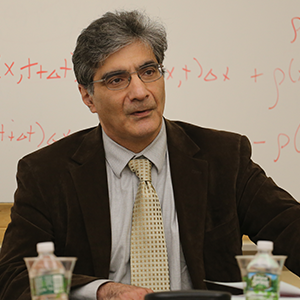 Throughout his career, Ambassador Shougarian has had numerous public appearances, talks and lectures at leading US, European, Middle Eastern and Russian academic and policy institutions. He has published extensively on conflict resolution, regional cooperation and the new geopolitical identity of the Black Sea/South Caucasus region. Ambassador Shougarian is also the author of two books: West of Eden, East of the Chessboard (2010) and The Politics of Immaculate Misconception: The Ides of the Post-Secular Age (2013). He has previously served as Armenia’s Deputy Foreign Minister (1999-2005), Ambassador to Italy, Spain and Portugal (2005-2008), and Armenia’s first Ambassador to the United States (1993-1999). He also served as a senior staffer for the Armenian Parliament’s Standing Committee on Foreign Affairs (1991), and a senior foreign policy aide and spokesperson for President Ter-Petrossian (1992). Currently, Ambassador Shougarian is a scholar/lecturer at the Fletcher School of Law and Diplomacy at Tufts University.
Throughout his career, Ambassador Shougarian has had numerous public appearances, talks and lectures at leading US, European, Middle Eastern and Russian academic and policy institutions. He has published extensively on conflict resolution, regional cooperation and the new geopolitical identity of the Black Sea/South Caucasus region. Ambassador Shougarian is also the author of two books: West of Eden, East of the Chessboard (2010) and The Politics of Immaculate Misconception: The Ides of the Post-Secular Age (2013). He has previously served as Armenia’s Deputy Foreign Minister (1999-2005), Ambassador to Italy, Spain and Portugal (2005-2008), and Armenia’s first Ambassador to the United States (1993-1999). He also served as a senior staffer for the Armenian Parliament’s Standing Committee on Foreign Affairs (1991), and a senior foreign policy aide and spokesperson for President Ter-Petrossian (1992). Currently, Ambassador Shougarian is a scholar/lecturer at the Fletcher School of Law and Diplomacy at Tufts University.
Tuesday, September 24
The Holocaust
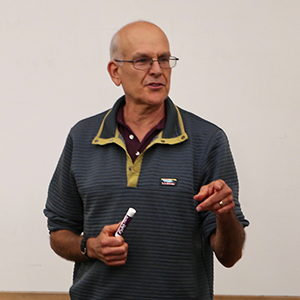 Guest Lecturer: Dr. Steven Cohen, Tufts University
Guest Lecturer: Dr. Steven Cohen, Tufts University
Steve Cohen is a Senior Lecturer in the Department of Education at Tufts University. He taught high school history for two decades and has taught at Tufts since 1995. He has also had the opportunity to work on educational projects beyond the classroom. He edited and wrote anthologies to accompany the public television documentaries Vietnam: A Television History and Eyes On The Prize. Cohen was a Program Associate with Facing History and Ourselves for many years and has written articles about teaching controversial issues such as Vietnam, the dropping of the atomic bomb, and the Holocaust. He also does projects for the pbslearningmedia.org website on various historical subjects. His publications include The Cross and the Star: A Study Guide; Secrecy and Democracy; Eyes on the Prize: A Sourcebook; and Vietnam Anthology and Guide to a Television History.
Thursday September 26
First In-Class Exam
Tuesday, October 1
Memory and Mass Atrocities
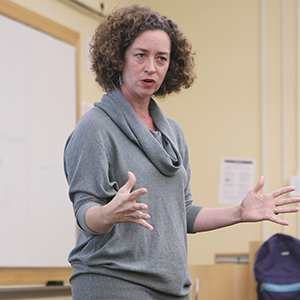 Guest Lecturer: Dr. Bridget Conley, World Peace Foundation
Guest Lecturer: Dr. Bridget Conley, World Peace Foundation
Bridget Conley is the Research Director of the World Peace Foundation and Associate Research Professor at The Fletcher School. At WPF, she is the lead researcher on the Mass Atrocities program. Her current research focuses on memory following mass atrocities, and has produced the book, Memory from the Margins: Ethiopia’s Red Terror Martyrs Memorial Museum (Palgrave 2019). She is the editor of How Mass Atrocities End: Studies from Guatemala, Burundi, Indonesia, the Sudans, Bosnia-Herzegovina, and Iraq (Cambridge University Press 2016). She has published on issues related to the 1992 – 1995 war in Bosnia, mass atrocities and genocide, and how museums can engage on human rights issues. She previously worked as Research Director for the U.S. Holocaust Memorial Museum’s Committee on Conscience, where she led the Museum’s research and projects on contemporary threats of genocide, including curating an exhibition, From Memory to Action: Meeting the Challenge of Genocide Today.
Thursday, October 3
The Cambodian Genocide
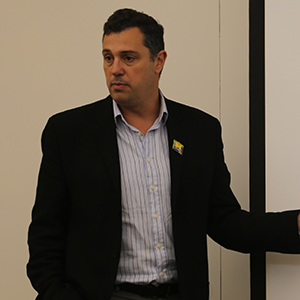 Guest Lecturer: Professor John Ciorciari, University of Michigan
Guest Lecturer: Professor John Ciorciari, University of Michigan
John D. Ciorciari is an associate professor of public policy and director of the Ford School's International Policy Center at the University of Michigan. His research focuses on international law and politics in the Global South. He is the author of The Limits of Alignment: Southeast Asia and the Great Powers since 1975 (Georgetown University Press 2010) and co-author of Hybrid Justice: The Extraordinary Chambers in the Courts of Cambodia (University of Michigan Press 2014). He is an Andrew Carnegie Fellow and a senior legal advisor to the Documentation Center of Cambodia, which promotes historical memory and justice. Ciorciari served as a postdoctoral fellow at Stanford (2007-09), a policy official in the U.S. Treasury Department's Office of International Affairs (2004-07), and an associate at the international law firm of Davis Polk & Wardwell.
Tuesday, October 8
The Media-Genocide Nexus: Rwanda and Darfur
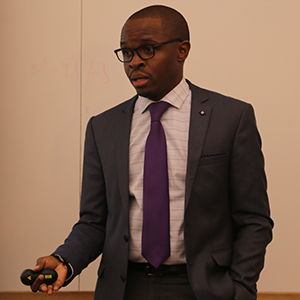 Guest Lecturer: Professor James Siguru Wahutu, New York University
Guest Lecturer: Professor James Siguru Wahutu, New York University
Siguru Wahutu graduated with a Sociology degree from the University of Minnesota. Commencing in July 2019, he is an assistant professor in New York University’s Department of Media, Culture, and Communication. His research interests are in Media Organizations, Media Manipulation, Data Privacy, Sociology of Knowledge, Genocide, Mass Violence, and Ethnicity. His current book project examines how media fields in Africa construct knowledge about instances of massive human rights violations, such as the atrocities in Darfur. james' research has appeared in academic journals such as African Affairs, Sociological Forum, Media, Culture, and Society, and Global Media and Communication. He has also written about global media patterns on the coverage of genocide in Africa (with Dr. Joachim Savelsberg) and on ethnicity and land politics in Kenya (with Dr. Tade Okediji).
Thursday, October 10
Ethnic Cleansing in Bosnia and The Srebrenica Genocide
Lecturer: Professor Williams
Tuesday October 15
No class-Monday schedule
Thursday, October 17
Human Rights, International Law and Genocide Prevention
 Guest Lecturer: Professor Anthony Clark Arend, Georgetown University
Guest Lecturer: Professor Anthony Clark Arend, Georgetown University
Anthony Clark Arend is Professor of Government and Foreign Service at Georgetown University. He served as Senior Associate Dean for Graduate and Faculty Affairs (later Vice Dean) in the Walsh School of Foreign Service from August 2015 until July 2018. He served as Director of the Master of Science in Foreign Service Program from 2008-2017. His research and teaching are in the fields of international law, national security law, international legal theory, and human rights. He has published seven books, including Legal Rules and International Society, International Law and the Use of Military Force (co-authored), and Human Dignity and the Future of Global Institutions (co-edited). With Professor Christopher C. Joyner, he founded the Institute for International Law & Politics at Georgetown and served as co-director of the Institute from 2003-2008. His has also served an adjunct professor of law at the Georgetown University Law Center. He serves as a Faculty Liaison to the Georgetown Institute for Politics and Public Service. He has served as Chair of the Main Campus Executive Faculty and Vice President of the Faculty Senate for the Main Campus. Prior to coming to Georgetown, he was a Senior Fellow at the Center for National Security Law at the University of Virginia School of Law. He has also served as an Articles Editor for the Virginia Journal of International Law. Arend is a Life Member of the Council on Foreign Relations and serves as a Senator on the Board of Governors of the Georgetown University Alumni Association. In April 2017, Arend received the John Carroll Award from the Georgetown University Alumni Association. This award ''is conferred upon Georgetown alumni whose achievements and record of service exemplify the ideals and traditions of Georgetown and its founder'' and is the highest honor given by the Alumni Association.
Tuesday, October 22
Nazi Trials in Postwar Europe and the Limits of Law
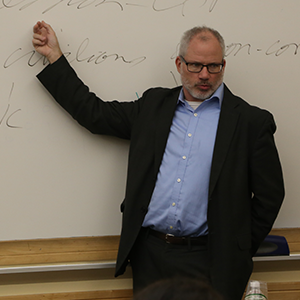 Guest Lecturer: Professor Devin Pendas, Boston College
Guest Lecturer: Professor Devin Pendas, Boston College
Devin Pendas is an Associate Professor and the Director of Graduate Studies at Boston College. Pendas' teaching interests include courses on German history, European legal history, the history of war and genocide, the history of war crimes trials, and the history of human rights. His research focuses on war crimes trials after World War II, particularly on West German Holocaust trials. He is currently working on two projects: a history of Nazi trials in German courts in all occupation zones from 1945 to 1950, to be published by Cambridge University Press; and a synthetic history of law and mass violence in the modern period. Pendas is a faculty affiliate and co-chair of the Contemporary Europe Study Group at the Center for European Studies at Harvard University. He has received research fellowships from the German Academic Exchange Service, the MacArthur Foundation, the Center for Contemporary Historical Research in Potsdam, Germany, the U.S. Holocaust Museum, and the American Council of Learned Societies (Burkhardt Fellowship). He has been a guest professor at Meiji University in Tokyo and the J.W. Goethe University in Frankfurt.
Thursday, October 24
International Tribunals and the Prevention of Mass Atrocity Crimes
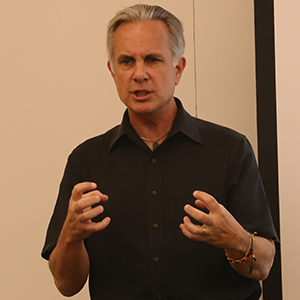 Guest Lecturer: Professor James Meernik, University of North Texas
Guest Lecturer: Professor James Meernik, University of North Texas
James Meernik is Regents Professor of Political Science and Director of the Castleberry Peace Institute at the University of North Texas. His is also Division Coordinator for the Social Sciences in the College of Arts and Sciences. He specializes in research on international justice and international courts, post conflict peace building, and United States foreign policy. Meernik’s research focuses on the judgments of the international criminal tribunals and the impact these decisions have on local populations. Currently, he is working on projects related to victim and witness testimony at international tribunals, the impact of international tribunals, international human rights and peace and justice in Colombia. He teaches introductory American government courses, peace studies, United States foreign policy, transitional justice, and international criminal law courses. From 2003-2008, Meernik was associate editor of the flagship journal of the International Studies Association, International Studies Quarterly. He co-leads a UNT Study Abroad Program to the International Criminal Tribunal for the Former Yugoslavia that won the 2007 American Political Science Association award for the most innovative course in the United States. Meernik has conducted research in The Hague, Bosnia, Rwanda, and Arusha, Tanzania on transitional justice issues. He won a Fulbright Specialist grant to the Autonomous University of the State of Mexico (UAEM) in 2009 to teach a course on post-conflict peace building, and another Fulbright Specialist award in 2013 to lecture and develop curriculum with Soochow University in Taiwan. He has authored over seventy articles and book chapters and has authored or co-edited eight books on international relations. He was formerly Chair of the Department of Political Science (2002 – 2008); Associate Dean of the College of Arts and Sciences (2009); American Council on Education Fellow (2009-2010) and Acting Dean of the Toulouse Graduate School (2010-2012). He has taught at the University of North Texas since 1991.
Thursday, October 31
The Responsibility to Protect
Lecturer: Professor Williams
Thursday, October 31
The Use of International Criminal Law in Response to Atrocity: A Regime in Crisis?
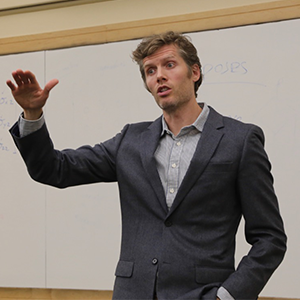 Guest Lecturer: Professor Tom Dannenbaum, The Fletcher School of Law and Diplomacy
Guest Lecturer: Professor Tom Dannenbaum, The Fletcher School of Law and Diplomacy
Tom Dannenbaum is assistant professor of international law at The Fletcher School of Law and Dipomacy. Prior to joining The Fletcher School in 2017, he was lecturer in human rights at University College London and visiting lecturer in law and Robina Foundation Visiting Human Rights Fellow at Yale Law School. Dannenbaum writes on international law, focusing primarily on the laws of war, the law on the use of force, international criminal law, shared responsibility, and international judging. He has also written on peace negotiations, terrorist strategy, reparations, and the philosophical basis for punishing atrocity crimes perpetrated via the state. His work has been published in a range of leading journals, including the Yale Law Journal, the European Journal of International Law, International & Comparative Law Quarterly, the Harvard International Law Journal, and Security Studies. His book, The Crime of Aggression, Humanity, and the Soldier, was published by Cambridge University Press in 2018. His article, "Why Have We Criminalized Aggressive War?", was awarded the Lieber Prize by the American Society of International Law in 2017. And his work on accountability for peacekeeper abuses has been cited by the International Law Commission and the Hague Court of Appeals in the Netherlands.
Tuesday, November 5
Kosovo
Lecturer: Professor Williams
Tuesday, November 12
Syria
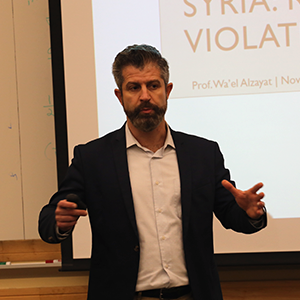 Guest Lecturer: Wa’el N. Alzayat, Chief Executive Officer, Emgage
Guest Lecturer: Wa’el N. Alzayat, Chief Executive Officer, Emgage
Wa'el Alzayat is CEO of Emgage Foundation, a national civic education and engagement grassroots organization for Muslim Americans. Alzayat previously served with distinction as a U.S. Middle East policy expert at the U.S. Department of State for ten years, including as senior policy advisor to U.S. Ambassador to the U.N. Samantha Power, Syria outreach coordinator with Ambassador Robert Ford, and special assistant to U.S. Ambassador to Iraq James Jeffrey. Alzayat has long been a passionate advocate for protecting fundamental American values and freedoms and increasing the civic engagement of minority communities. Alzayat was recently named one of the Top 10 Inspiring Arab Americans Leaders by the Huffington Post.
Thursday, November 14
Myanmar
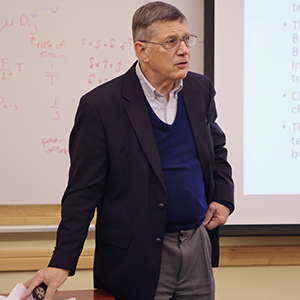 Lecturer: Professor Emeritus David Dapice, Tufts University
Lecturer: Professor Emeritus David Dapice, Tufts University
David Dapice is a Senior Economist for the Vietnam and Myanmar Program at the Ash Center for Democratic Governance and Innovation at the Kennedy School of Government at Harvard University. He is a leading expert on the economic development of Southeast Asia and has worked extensively in Indonesia, Thailand, Cambodia, Myanmar, and Vietnam. He was principal advisor to the Indonesian Ministry of Finance when this country enjoyed its period of rapid growth. He is Professor Emeritus of Economics at Tufts University, where served as Chair of the Economics Department. He has taken leave at the World Bank (as a Brookings Policy Fellow in 1976-77), the Rockefeller Foundation (1980-81), and the Harvard Institute for International Development (1990-91). He has studied the Vietnamese economy since the late 1980s, with a particular emphasis on macroeconomic issues, public investment policy, and regional development. Dapice’s expertise on matters of economic policy is regularly sought by the Vietnamese government. He has authored and co-authored a number of policy studies including Choosing Success: The Lessons of East and Southeast Asia and Vietnam’s Future. Professor Dapice has worked in a variety of developing nations, primarily in Southeast Asia, since 1971 and is currently among the leading analysts of the Vietnam economy. He teaches at the Fulbright School in HCMC, is engaged in research in Vietnamese government economic policies, and is also active in studying and consulting on other Southeast Asian economies. He writes for YaleGlobal, a leading web-based journal covering issues of globalization.
Tuesday, November 19
The Herero and Nama Genocide
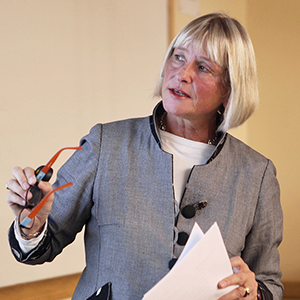 Lecturer: Professor Katharina von Hammerstein, University of Connecticut
Lecturer: Professor Katharina von Hammerstein, University of Connecticut
Katharina von Hammerstein is Professor of German Studies at the University of Connecticut, Storrs. Her area of scholarly expertise is German-language literature and culture of the late eighteenth, nineteenth and early twentieth centuries. Her publications focus on German Romanticism (including extensive work on Sophie Mereau-Brentano); autobiographical writings as political practice in nineteenth- and early twentieth-century public discourses; the ways women have inscribed themselves into literary, social and political discourses in the nineteenth century; representations of female happiness from the Enlightenment to the turn of the century; colonial constructions of Self and Other as represented in the ways Black men and women have been represented in German-language literature, ethnology and visual arts around 1900; and human rights and humanitarianism in German-language literature. She has also published in the area of interdisciplinary curriculum development, i.e., on approaches to linking language learning to the learning in other disciplines, such as history, art history, political science, geography, film, etc. Her scholarly background comes to bear in her graduate courses on German Romanticism; Self-Writings and Writing Yourself; Colonial and Postcolonial German-African Connections; Gender and Literature; Love in Literature; the 1848 Revolution; and various other topics of eighteenth through twentieth-century literature and culture.
Thursday, November 21
Libya
Lecturer: Professor Williams
Tuesday, November 26
The Role of the United Nations
Lecturer: Professor Williams
Thursday, November 28
No Class-Thanksgiving
Lecturer: Professor Williams
Tuesday, December 3
After Genocide: Traditional Justice and Reconciliation
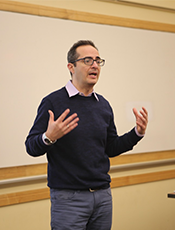 Guest Lecturer: Professor Ernesto Verdeja, University of Notre Dame
Guest Lecturer: Professor Ernesto Verdeja, University of Notre Dame
Ernesto Verdeja holds a joint appointment in the Department of Political Science and the Kroc Institute for International Peace Studies at the University of Notre Dame. He is the author of Unchopping a Tree: Reconciliation in the Aftermath of Political Violence (Temple University Press, 2009). He has published articles in Constellations, Perspectives on Politics, Contemporary Political Theory, The Review of Politics, The European Journal of Political Theory, International Political Science Review, Res Publica, Metaphilosophy, Genocide Studies and Prevention, and Contemporary Politics, as well as numerous chapters in edited collections. Verdeja is also coeditor of volumes on peacebuilding and social movements, the field of genocide studies, and the international politics of genocide prevention. He is currently working on a book project on comparative genocide. Verdeja is a faculty fellow at the Nanovic Institute for European Studies, the Klau Center for Civil and Human Rights, and the Kellogg Institute for International Studies, all part of the Keough School of Global Affairs, and a core faculty member of the Center for the Study of Social Movements. He is also the Executive Director of the Institute for the Study of Genocide, a non-profit organization founded in 1982 to promote research and policy analysis on the causes and prevention of genocide and political violence. Verdeja has served two terms on the Advisory Board of the International Association of Genocide Scholars, a worldwide scholarly association devoted to the study and prevention of genocide, and regularly consults on political violence issues with various government agencies and nongovernmental organizations.
Thursday, December 5
The Role of Regional Organizations
Lecturer: Professor Williams
Wednesday, December 18
Final Exam
Thursday, January 16
EPIIC Reorientation
Tuesday, January 21
Kosovo
Lecturer: Professor Williams
Thursday, January 23
The Role of Regional Organizations
Lecturer: Professor Williams
Tuesday, January 28
Symposium Prep
Thursday, January 30
Symposium Prep
Tuesday, February 4
Bosnia
Tuesday, February 6
The Holocaust
Tuesday, February 11
Diplomats and the Choice to Protect
Thursday, February 13
Symposium Prep
Tuesday, February 18
Symposium Prep
Thursday, February 20
No Class, Monday’s schedule
Tuesday, February 25
Symposium Prep
Thursday, February 27
Inquiry Prep
Tuesday, March 3
Inquiry Prep
Thursday, March 5
Inquiry Prep
Tuesday, March 10
Symposium Prep
Thursday, March 12
Symposium Prep
Tuesday, March 17
No Class, Spring Break
Thursday, March 19
No Class, Spring Break
Tuesday, March 24
TILIP Begins
Thursday, March 26
Symposium Begins
Tuesday, March 31
Inquiry Prep
Thursday, April 2
Inquiry Begins
Tuesday, April 7
Cambodia
Thursday, April 9
Rwanda
Tuesday, April 14
Armenia
Thursday, April 16
Why Poetry Matters
Tuesday, April 21
Yemen
Thursday, April 23
Preventing Genocide and Mass Atrocities – Class Simulation
